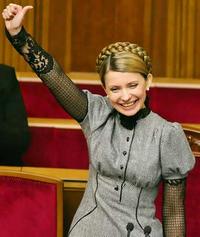
UKRAINIAN ELECTION OVER, BUT ITS OUTCOME UNCLEAR
Publication: Eurasia Daily Monitor Volume: 4 Issue: 182
By:

Ukraine’s September 30 early parliamentary election produced a hung parliament, just like the regular election in March 2006. Like last year, the Party of Regions (PRU) of Prime Minister Viktor Yanukovych scored more votes than other parties. The Our Ukraine-People’s Self-Defense bloc (NUNS), backed by President Viktor Yushchenko, came third with nearly the same result as Our Ukraine in 2006. The opposition Yulia Tymoshenko Bloc (BYuT), however, made a sensation, scoring almost as much as the PRU. BYuT benefited from the snap election most of all, and its leader, Yulia Tymoshenko, stands a high chance of replacing Yanukovych as prime minister.
Three non-partisan exit polls were conducted after polls closed on September 30, showing that four forces definitely overcame the 3% barrier to gain seats in parliament, and two more may yet clear the barrier. The exit polls showed that 34.5-35.2% of Ukrainians voted for the PRU, 30.4-32.34% for the BYuT, 13.4-14.4% for NUNS, and 4.5-5.1% for the Communists (CPU). Two of the exit polls showed that the centrist Bloc of Volodymyr Lytvyn may score 4-4.5%, and that the Socialists (SPU) scored slightly less than 3%.
Turnout was slightly over 62%. With 94% of ballots counted by 8 am Kyiv time on October 2, the PRU scored 34%, the BYuT 30.1%, NUNS 14.27%, and the CPU 5.37%. Lytvyn’s bloc — the only party among the front-runners that failed to make it into parliament in 2006 — scored 4%. The fate of the SPU is still undecided.
BYuT was expected to perform better than in 2006, when it scored 22%. Not many observers, however, believed that it would clear the 30% mark. Ukrainian sociologists suggested that Tymoshenko’s aggressive election tours during the two weeks preceding the election, when the results of opinion polls could not be made public, may have added as much as 6-10% to her bloc’s popularity.
Observers from the OSCE, the parliamentary assemblies of NATO and the Council of Europe, the European Parliament, the National Democratic Institute, and Russia agreed that the election was generally free and fair. A number of irregularities were reported across the country, such as double entries, omissions, and nonexistent names in voter rolls; also a policewoman was found shot dead at a polling station in Eastern Ukraine. The irregularities, however, did not affect the final outcome of the polls.
This, however, does not mean that the election will be recognized as free and fair at home. Some two-thirds of Ukrainians were convinced that the vote would be rigged, the Kyiv-based analyst Kost Bondarenko told RTVi. The SPU — Yanukovych’s key ally in the outgoing parliament — said that it would contest any outcome of the election in court. The BYuT made it clear that it would contest the election results in the PRU’s strongholds in the east of Ukraine. Yuriy Lutsenko, who tops the NUNS list, warned of a new revolution if his party fails to enter a ruling coalition.
The Ukrainian constitution stipulates that the majority coalition in parliament shall form the cabinet, and that the previous cabinet shall resign before the newly elected parliament. This means that Yanukovych has to resign, although Yushchenko may reappoint him if the PRU manages to build a majority again. This, however, will not be easy to achieve. NUNS and BYuT leaders proclaimed ahead of the election that they would be in the same camp irrespective of the election result. Taken together, the two scored more than the PRU and its allies in the pro-Yanukovych coalition — the CPU and the SPU. This means that NUNS and the BYuT should be able to form the majority.
The post of prime minister in a NUNS-BYuT coalition should go to Tymoshenko, as her bloc scored more than twice as many votes as NUNS. Tymoshenko, who served as prime minister in the first post-Orange Revolution government in February-September 2005, has never concealed her ambition to become prime minister again. Speaking about her foreign policy priorities to the weekly Korrespondent shortly before the election, Tymoshenko said: “Russia is destined to be our eternal partner, no matter [whether] you like it or not. On the other hand, we have Poland… and Georgia, of course. There is also the world’s oil zone stretching from Turkmenistan to Iran.” Speaking about the European Union, she said France and Germany should be Ukraine’s key allies there.
The PRU may retain control over the government if they manage to split the Yushchenko-Tymoshenko union, if either the BYuT or NUNS performs significantly worse than the exit polls predicted, or if the Socialists overcome the 3% barrier, and simultaneously Lytvyn’s bloc agrees to join a coalition with the PRU. It is unclear which camp Lytvyn’s bloc will join, as its representatives kept mum on this during the campaign. The position of Lytvyn’s bloc may be decisive for the fate of the Yanukovych cabinet if the BYuT-NUNS alliance fails to score as much as to secure control of 226 seats in Ukraine’s 450-seat unicameral parliament.
(Kommersant Ukraine, September 26; Korrespondent, September 28; Itar-Tass, RTVi, September 30; Channel 5, September 27, 30, October 1)




